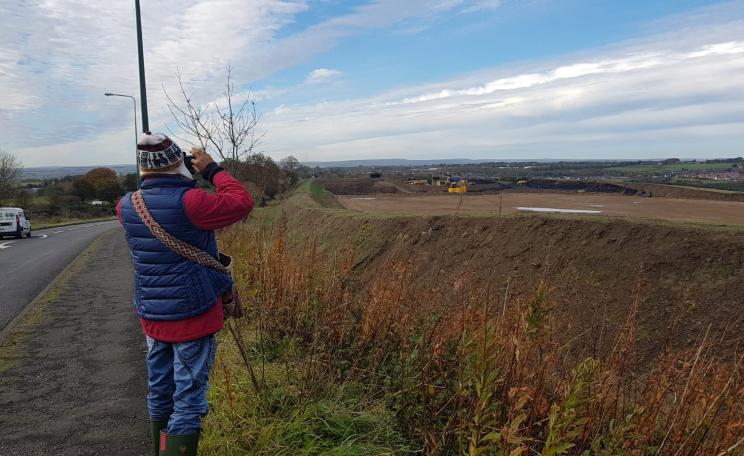Why does climate change science generate so much heat and controversy? In a recent article in the journal Climatic Change, I argue that we have a vested interest not to cut carbon emissions, similar to that of slave-owners in the 19th century who opposed the abolition of slavery.
First, slaves and fossil-fuelled machines play(ed) similar economic and social roles: ‘energy slaves' (machines powered by fossil fuels) now do the work in our homes, fields and factories, which used to be carried out by slaves and servants in the past. Both slave societies and developed countries externalise(d) labour (labour came from slaves in the former case and 'work' is provided by machines in the latter), and both slaves and modern machines free(d) their owners from daily chores.
Before the advent of fossil fuel powered appliances, 'slavery was the most efficient means by which the ambitious and powerful could become richer and more powerful. It was the answer to energy shortage', writes historian John McNeill. This was well understood by educated men and women from the antiquity onwards. As the leading historian of slavery David Brion Davis has noted, 'what made slavery so appealing and seductive, especially in the long era before self-powered appliances, engines, and other labor-saving devices, was the freedom it brought for slaveholders'. As a consequence, economically and socially, we are today as dependent on fossil fuels as slave societies were dependent on bonded labour.
Second, in differing ways, suffering resulting (directly) from slavery and (indirectly, through Climate Change) from the excessive burning of fossil fuels are now morally comparable. When we burn oil or gas at a rate that exceeds what the ecosystem can absorb, we contribute to global warming, which in turn contributes to droughts, floods or hurricanes. These climatic events cause suffering to other human beings, today and in the future. They contribute to crop failures and put some people at risk of falling into debt bondage, a condition similar to traditional slavery. Other people are driven away from their land because of poverty, and become refugees, stationed in camps, where they may have to work for unscrupulous employers or in prostitution rings (a form of slavery in which refugees are over-represented).
Similarly, cheap fossil fuels facilitate imports of goods from countries without (or with grossly inadequate) legislation to protect economical and social rights of employees and workers. Indeed, our global economy rests on Ricardo's famous comparative advantage concept, which is based on the assumption of negligible transport costs. The availability of cheap energy is a required condition for the transportation of foreign goods on a massive scale over large distances, otherwise it would become uneconomical. Fossil fuels hence help externalise labour and perpetuate oppression.
I am not arguing our collective behaviour is equivalent to that of slave-owners of the past: one key difference lies in the different ways in which suffering caused by slavery, on the one hand, and by the burning of fossil fuels, on the other, operate. In the case of slavery, oppression operates more or less directly. In the fossil fuel economy, however, the sufferings engendered by the burning of fossil fuels are indirect and often imperceptible by those who are causing it. The comparison thus ignores the direct human experience that characterized slavery. (However, many people - for example consumers of slave goods or absentee plantation owners who lived in the UK - also benefited from slavery without maintaining direct connections to it. These people can certainly be said to have committed a morally equivalent sort of human transgression to people who benefit from fossil fuel use).
A second crucial difference is that there is no willingness to cause harm or dehumanize others by burning fossil fuels. In contrast, motives for enslavement were, and are, by no means limited to economic needs and frequently included a willingness to control others.
We have a mental image of slave owners as cruel, sadistic, inhuman brutes. Yet, we forget too easily the ordinariness of slave ownership in past centuries. Slavery seemed normal and indispensable. George Washington, Thomas Jefferson and even Toussaint L'Ouverture, owned slaves. Both lifestyles and incomes depended on it, as we today depend on fossil fuels. Similarly, many slave owners lived with the impression that they were decent people, as we do. Adam Hochschild, in his captivating book Bury The Chains, compares the mental framework of slave owners with the way we think about automobiles today: "for reasons of global warming, air quality, traffic, noise, and dependence on oil, one can argue, the world might be better off without cars. ... Yet, does anyone advocate a movement to ban automobiles from the face of the earth?". We don't contemplate banning automobiles because life with fossil fuels looks easy. The convenient life our 'energy slaves' give us is a powerful incentive not to act on climate change.
Jean-Francois Mouhot is a post-doctoral research fellow at the University of Birmingham. 'Past connections and present similarities in slave ownership and fossil fuel usage' is published in the journal Climatic Change (the article is in open access until 31 December 2010). There is also a podcast discussing the article.
| READ MORE... | |
 |
NEWS ANALYSIS The psychology of climate change: why we do nothing Well-publicised simple steps like using energy-saving light bulbs may be making it more difficult to prepare people for the bigger changes needed to tackle climate change, argue psychologists |
 |
HOW TO MAKE A DIFFERENCE How to campaign: climate change and energy From direct action campaigns to eco-village renewable energy systems, there are many ways to learn about and get involved in actions to prevent climate change |
 |
COMMENT COP16: Cancun - Colonialism by the sea Corporate and complicit, says Polly Higgins as she surveys the luxury accommodation enjoyed by high-flyers at the latest climate conference |
 |
HOW TO MAKE A DIFFERENCE CAMPAIGN HERO: Richard Miller of ActionAid UK The Director of ActionAid UK talks to us about ending global poverty, achieving trade justice and making supermarkets accountable |
 |
INTERVIEW Paul Collier: saying 'nature has to be preserved' condemns the poor to poverty Oxford Economics Professor and former head of Development Research at the World Bank, Paul Collier on reconciling romantic environmentalism and mainstream economics to help poor countries |





